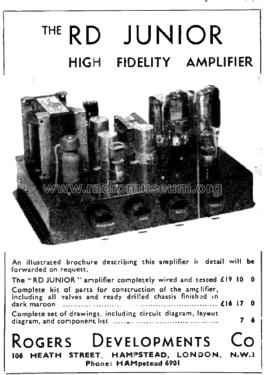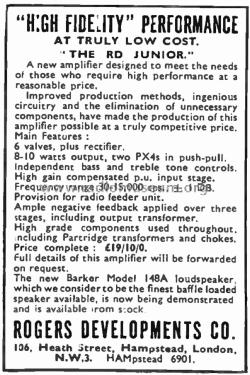- Produttore / Marca
- Rogers, Catford (see also Rogers Birmingham)
- Anno
- 1949 ?
- Categoria
- Amplificatore audio o mixer audio
- Radiomuseum.org ID
- 356891
- Numero di tubi
- 6
- Valvole
- Principio generale
- Amplificatore audio
- Gamme d'onda
- - senza
- Tensioni di funzionamento
- Alimentazione a corrente alternata (CA)
- Altoparlante
- - Questo apparecchio richiede altoparlante/i esterno/i.
- Potenza d'uscita
- 10 W (qualità ignota)
- Materiali
- Mobile di metallo, valvole visibili
- Radiomuseum.org
- Modello: RD Junior - Rogers, Catford see also
- Forma
- Chassis o in scatola da montaggio
- Annotazioni
-
RD Junior Amplifier: A Classic Design
The Rogers RD Junior amplifier, introduced in 1949, was a simple yet effective integrated mono amplifier. Initially powered by PX4 output valves, it offered an output of 10 watts and was available in both kit form (£16.17s) and factory-built (£19.10s). Enthusiasts could also purchase a set of layout and circuit diagrams with a parts list for 7s. 6d.
As advertised in Wireless World in March 1949:
High-Fidelity Performance at Truly Low Cost
The RD Junior was designed to meet the needs of those seeking high performance at a reasonable price. Improved production methods, innovative circuitry, and the elimination of unnecessary components made this amplifier possible at a truly competitive price.
Key Features of the 1949 RD Junior:
- 6 valves plus rectifier
- 8-10 watts output (two PX4s in push-pull)
- Independent bass and treble tone controls
- High gain compensated phono input stage
- Frequency range: 30-15,000 cps, ±1 dB
- Provision for radio feeder unit
- Ample negative feedback applied over three stages, including the output transformer
- High-quality components throughout, including Partridge transformers and chokes
Note: The Wireless World advert from June 1949 shows a picture of this amplifier with tone controls, confirming that this 1949 version included them.
- Prezzo nel primo anno
- 19.50 GB £
- Bibliografia
- Wireless World (The), London (WW, 79) (Mar 1949, Page Ad 70.)
- Letteratura / Schemi (1)
- Wireless World (The), London (WW, 79) (Jun 1949, Page Ad 54.)
- Autore
- Modello inviato da Gary Cowans. Utilizzare "Proponi modifica" per inviare ulteriori dati.
- Altri modelli
-
In questo link sono elencati 46 modelli, di cui 45 con immagini e 6 con schemi.
Elenco delle radio e altri apparecchi della Rogers, Catford (see also Rogers Birmingham)

